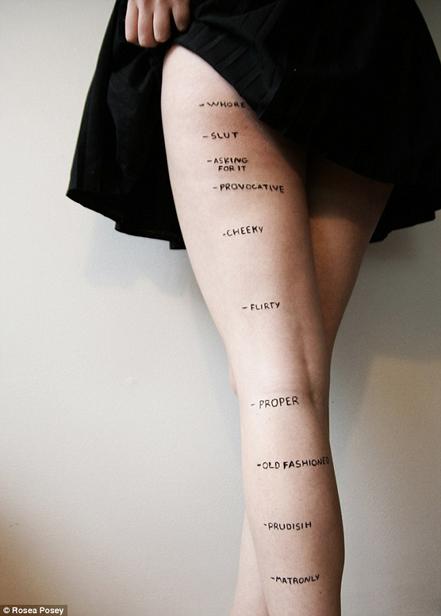 This post is part of a series discussing the 2013 Jewish Orthodox Feminist Alliance (JOFA) 8th International Conference of Feminism and Orthodoxy. You can read my notes on this session here.
This post is part of a series discussing the 2013 Jewish Orthodox Feminist Alliance (JOFA) 8th International Conference of Feminism and Orthodoxy. You can read my notes on this session here. ‘Slut!’: The Shame Effect was probably my favorite session at the whole conference. The panel included Leora Tanenbaum, feminist lecturer and author of Slut! Growing Up Female with a Bad Reputation; Rachel Hercman, a psychotherapist specializing in sexual health, dating, and relationships; and Laila Goodman, the Dean of Students at Gann Academy, a pluralistic Jewish school. The session was moderated by Dasi Fruchter, a student at Yeshivat Maharat. I was attracted to this session because of Leora Tanenbaum, whose book is famed in the secular feminist sphere, but I ended up finding each speaker very perceptive and interesting.
I personally have never been called a slut, nor have I ever felt like a victim of slut-shaming. I think this is because I attended a right-wing Orthodox all-girls high school for the past four years. The word slut was considered a bad word, tantamount to bitch, by the vast majority of girls in my school; very few would have even dreamed of using it in direct reference to another person. As I was always careful to follow the school dress code, even when it diverged from my own interpretation of tzniut, I was never criticized for my mode of dress. The only time I was exposed to potential slut-shaming was in collective settings, when faculty would address the school at large about the import of following tzniut; however, I never felt like these speeches contained slut-shaming. The only exception was after the Fogel family zt”l was murdered by terrorists, when my principal told the school that such tragedies would not occur if our skirts were longer. (She was fired later that year.)
Although I’ve never really felt slut-shamed, I know that many girls my age, particularly those at Orthodox schools that have dress codes based off tzniut (ritual modesty), complain bitterly about it. Goodman discussed how she, as a school administrator, has to deal with the fine line between disciplining and slut-shaming girls for dress code infractions. I appreciate the difficulty of her situation; she has to enforce school rules, but she doesn’t want to make her students feel bad about themselves.
I lack pity for students who break dress code (would you expect me to sympathize with students who break any other school rule?), but I strongly believe that faculty members have no right to call girls out in a way that makes them feel slut-shamed or religiously inferior. There’s a way to tell a girl (or boy, for that matter) that her outfit isn’t appropriate for school, and tzniut should not be dragged into it.
Hercman is probably not surprised that tzniut and slut-shaming are linked issues in Orthodox schools, as she discussed how slut-shaming in the Orthodox community primarily revolves around tzniutand shomer negiah (the prohibition of touching members of the opposite sex). I found Hercman particularly insightful. She touched on the idea that the community’s overemphasis on tzniut reduces women into bodies, and makes tzniut the most important halakha (Jewish law) for women. “The message is that women have to wear their religion and not necessarily have any internal religion,” she said.
Goodman and Hercman both focused on slut-shaming within the Jewish and Orthodox communities, and Tanenbaum discussed the issue on a broader level. Everything she said was eye-opening, but what intrigued me most was the new phenomenon of girls and women who embrace the label of slut in order to “assert a positive or defiant attitude about their sexuality” and try to own the identity.
I have never thought that reclaiming negative terms is a good idea, so I’ve always opposed using sexist epithets like slut and bitch in a positive way. Tanenbaum and I are of the same mind, believing that “whether bashing, shaming, or reclaiming, calling a girl or woman slutreinforces sexist norms…[and] perpetuates the rape culture.” To quote the cult classic Mean Girls, “You all have got to stop calling each other sluts and whores! It just makes it okay for guys to call you sluts and whores!” Even if a girl or woman feels that the word empowers them, on a large scale, it has a terrible effect on the social status of females, and should not be used.
Slut-shaming may not be an issue that I’ve struggled with, but I still think it’s extremely important for the feminist community to make society aware of the unacceptability of the term. Words carry unspeakable importance; from when we’re young, we’re taught that the ones we use can make others hurt or heal. It is imperative that we take what Goodman, Hercman, and Tanenbaum said about their experiences with slut-shaming and turn it into social change. For ourselves. For our daughters. For a better, more equitable, society.
I’m going to be traveling to Israel on Birthright for the next couple weeks, so I won’t be blogging for a while. See you soon!

